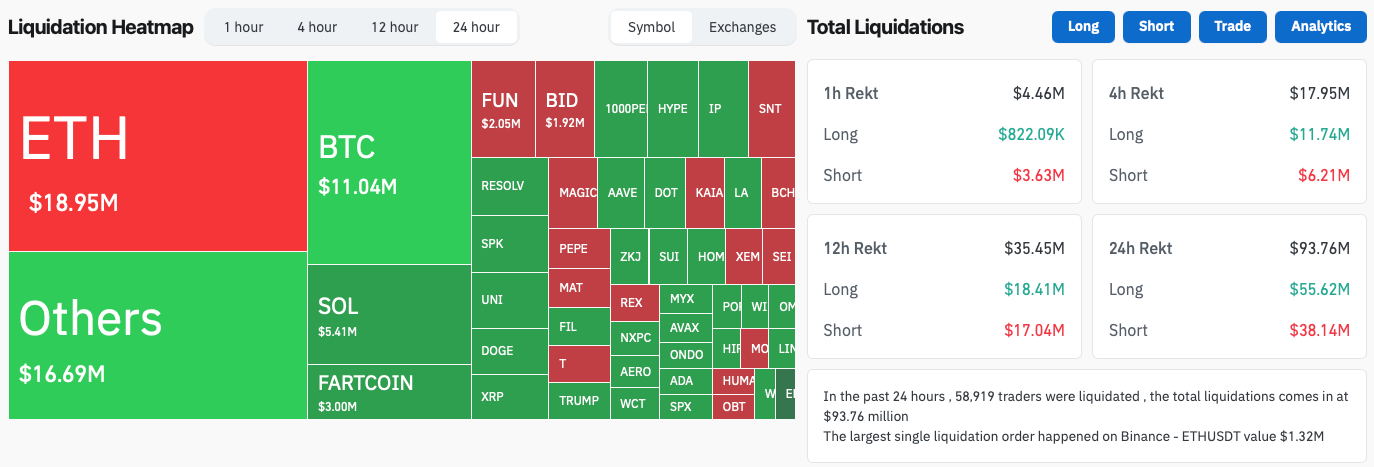
Global markets were largely muted as Wall Street remained closed for the Juneteenth holiday, but futures signaled caution ahead of the weekend, with S&P 500 and Nasdaq 100 futures falling 0.9% and 1.1% respectively. Investor sentiment was rattled by geopolitical tensions, as reports surfaced that senior U.S. officials are preparing for potential military action in the Middle East, with President Trump expected to decide on direct involvement within two weeks. Meanwhile, the Federal Reserve held interest rates steady but downgraded its economic outlook and reiterated concerns that new tariffs and conflict-driven oil price spikes could sustain inflation. In Europe, the Stoxx 600 dropped for a third straight session, weighed down by central bank uncertainty and fears of escalation in the Middle East. The Bank of England held rates at 4.25%, but a divided vote revealed growing pressure to support the economy amid persistent inflation, while the Swiss National Bank cut rates to zero to combat currency strength, and Norway delivered a surprise rate cut on weakening growth. UK credit card borrowing costs hit a 19-year high despite easing base rates, though consumer confidence rose on signs of economic stabilization. Commodities remained volatile, with Brent crude jumping 2.5% to US$78.63 on Middle East tensions, while gold held steady near US$3,372 as safe-haven demand stayed firm. Bitcoin and Ether also edged lower, slipping 0.5% and 0.8% respectively, amid broader market unease.
- The global crypto market cap decreased 0.4% over the past 24 hours to $3.24tn. The total crypto market 24h volume decreased 28% to $80bn.
- In the past 24 hours, crypto liquidations decreased 60% and totaled $94m, with 59% of them long positions.

- Hackers responsible for the $100 million exploit of Iranian crypto exchange Nobitex have escalated the attack by leaking the platform’s full source code, exposing its internal architecture and potentially endangering any remaining user funds. The group “Gonjeshke Darande” claimed responsibility for both the hack and the subsequent leak, citing Nobitex’s alleged ties to Iran’s government and its role in evading international sanctions. On Thursday, the group followed through on a 24-hour ultimatum, posting the exchange’s backend source code, server lists, cold wallet scripts, and other sensitive infrastructure details in a public thread on X.
- South Korea’s newly elected president, Lee Jae-myung, promised to reduce crypto trading transaction costs as part of his presidential campaign.
- Australia began taxing cryptocurrency as property, imposing capital gains taxes on transactions such as swaps, DeFi, and wrapped tokens, with the Australian Taxation Office conducting data sweeps targeting approximately 1.2 million users to ensure compliance with the new regulations.
- Bitget has selected Georgia as its next Eastern European location, attracted by the country’s clear regulations, tax benefits, and growing crypto user base.
- OKX has partnered with ConsenSys to integrate its DEX aggregator into MetaMask, giving users access to over 500 decentralized exchanges and new MEV protection via Servo.
- Nasdaq-listed Lion Group is launching a $600 million crypto treasury, anchored by Hyperliquid’s HYPE token, with initial funding from ATW Partners. The move marks a shift toward altcoin-focused corporate treasuries, with Solana and Sui also included. CEO Wilson Wang called Hyperliquid key to the firm’s DeFi expansion.
- Hypersphere investment partner Mehdi Farooq says he lost six wallets and “years of savings” after falling victim to a phishing attack during a fake Zoom call. The attack began when a hacked Telegram account of a known contact invited him to a meeting, later switching to Zoom “for compliance.” During the call, Farooq was prompted to install a Zoom update, which compromised his system. The attackers, linked to a North Korea-affiliated group, drained his funds while chatting as if nothing was wrong.
- A massive breach has exposed over 16 billion login credentials according to a June 2025 report from Cybernews. The data—sourced from 30 separate databases, many tied to infostealer malware—includes credentials for services like Apple, Google, Facebook, and government platforms. Researchers say the leak consists largely of fresh, structured data gathered from malware logs, with each entry typically containing a URL, username, and password. Though some records overlap, the scale and recency of the leak pose severe risks for crypto holders and enterprises alike, enabling potential phishing attacks, identity theft, and account takeovers. The datasets, briefly exposed through unsecured storage systems, were likely compiled by cybercriminals, though attribution remains unclear.
- Kraken, in partnership with Babylon, has launched a bitcoin staking service, enabling users to earn Baby Tokens.
- According to Glassnode data, short-term Bitcoin holders sold 15,000 BTC at a loss throughout this past week.
- Semler Scientific plans to expand its Bitcoin holdings from 3,808 BTC to 105,000 BTC by 2027, aiming to own 0.5% of Bitcoin’s total supply. The health tech firm, which began acquiring Bitcoin in May 2024, said it will use equity, debt, and operational cash to fund the purchases. To lead the effort, Semler has appointed Bitcoin researcher Joe Burnett as director of Bitcoin strategy. The move follows a broader trend of public companies prioritizing Bitcoin accumulation. While Semler has seen a $177 million paper gain on its BTC holdings, analysts like VanEck’s Matthew Sigel warn such strategies could backfire if share prices fall too close to net asset value, potentially diluting shareholder value.
